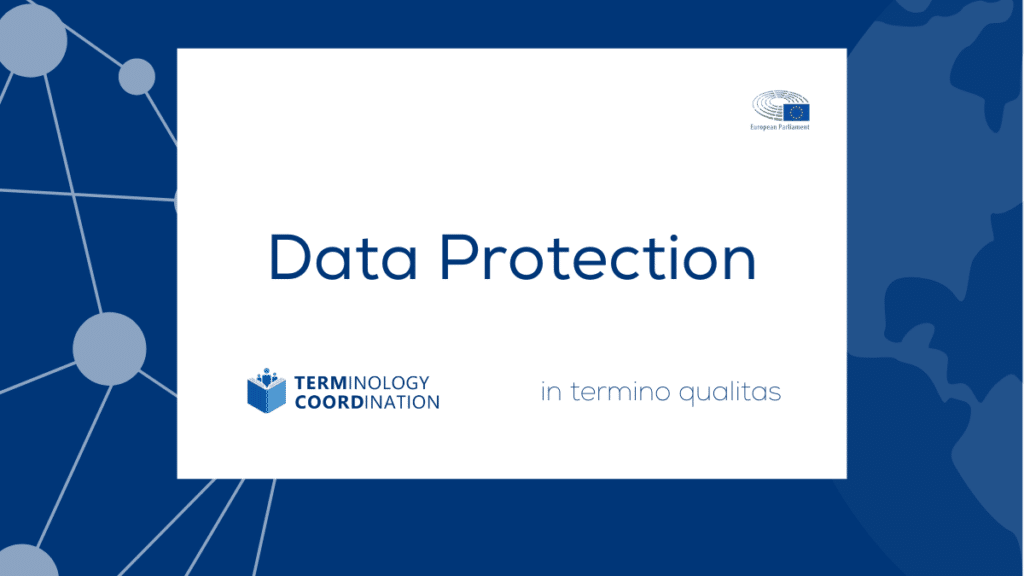
Regulation (EU) 2018/1725 applies to the processing of personal data carried out by the European Parliament.
- Who processes your personal data?
The European Parliament is acting as the controller1 and the entity responsible for the processing is: European Parliament > Parliament’s Secretariat > Directorate-General for Translation > Directorate for Support and Technological Services for Translation > Terminology Coordination Unit.
You can contact the controller/entity at: dgtrad.termcoord@ep.europa.eu
- What is the purpose of the processing of your personal data?
Your personal data will be processed in order to promote DG TRAD’s terminology work and networking with external terminology experts and universities via its websites https://termcoord.eu/ and https://yourterm.eu/.
- What is the legal basis for the processing?
The legal basis for the processing is Article 5(1), points (a) and (d) of Regulation (EU) 2018/1725.
- What personal data is processed?
Personal data processed pertains solely to the following categories of data subjects, having obtained their prior written agreement:
- Staff and trainees of the Terminology Coordination Unit;
- Terminologists and study visitors interviewed by trainees of the Terminology Coordination Unit;
- University professors and students involved in terminology projects in the context of cooperation with the Terminology Coordination Unit.
Depending on the case, the personal data processed may contain some or all of the following elements: Title; First name; Surname; Birth year; Nationality; Academic grade; Function.
- How will your personal data be processed?
Your personal data are processed based on your written consent given via email prior to any information pertaining to you or your work being published on the the Terminology Coordination Unit’s websites. Your consent is archived in the Terminology Coordination Unit’s local drive on an EP server and stored until the information pertaining to you is no longer featured on the websites.
Data stored on the Terminology Coordination Unit’s local drive is protected by access restrictions and user log-in verification of the EP server. The administration of the websites is protected by a password, and the access is limited only to staff of the Terminology Coordination Unit.
- For how long will your personal data be stored?
Your personal data will be stored for as long as they remain relevant for the purposes of the Terminology Coordination Unit’s websites.
- Who are the recipients of your personal data?
The recipients of your personal data are staff members of the Terminology Coordination Unit and of the hosting company Keyweb.de. In case you have given your consent to the publication of information pertaining to you or your work on the Terminology Coordination Unit’s websites, this personal data is accessible by all visitors of the websites.
- Will your personal data be shared with a non-EU country or international organisation?
No, your personal data will not be shared with a non-EU country or international organisation.
- Are any automated processes2 and/or profiling3 used to make decisions, which could affect you?
No.
- What rights do you have?
You have the following rights:
- Right of access to your personal data.
- Right to rectification of your personal data.
- Right to erasure of your personal data.
- Right to restriction of processing.
- Right to object to processing.
- Right to withdraw your consent at any time, without affecting the lawfulness of processing based on consent before its withdrawal.
You may exercise these rights by contacting the data controller at: dgtrad.termcoord@ep.europa.eu
The right to lodge a complaint:
If you have any remarks or complaints regarding the way that your personal data is processed, you can contact the European Parliament’s Data Protection Officer at data- protection@europarl.europa.eu.
You have the right to lodge a complaint with the European Data Protection Supervisor at edps@edps.europa.eu.
1 A Controller is the public authority, agency or other body which, alone or jointly with others, determines the purposes and means of the processing of the personal data. The controller is represented by the head of the entity.
2 Making a decision solely by automated means and without any human involvement. {Theoretical Examples: internet page where selecting certain options will automatically place you in different mailing lists via which you are sent the corresponding monthly newsletter / using an automated system to mark “Multiple Choice” test answers and assign a pass mark according to the number of correct answers}.
3 Profiling analyses aspects of an individual’s personality, behaviour, interests and habits to make predictions or decisions about them. Used to analyse or predict aspects concerning the data subject’s performance at work, economic situation, health, personal preferences or interests, reliability or behaviour, location or movements, etc. {Theoretical Example: when using social media tools data is collected and your trends registered. This data is then used to form new/different predictions on you.}
